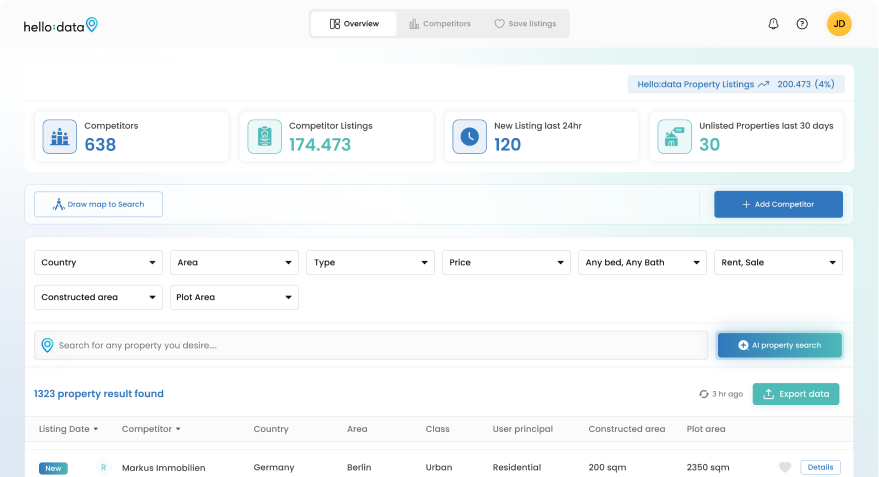Introduction
The real estate market in Spain offers exciting opportunities for expats looking to buy property. With its stunning landscapes, vibrant culture, and favorable climate, Spain attracts individuals seeking a new home or investment. Understanding how to purchase a property in Spain as an expat is crucial. The buying process can be complex, but with the right information, it becomes manageable.
Key Points to Consider:
- Market Overview: Spain’s real estate market has a diverse range of properties from modern apartments in bustling cities to charming villas in serene countryside. For instance, you might find a stunning Mediterranean villa with a guest house in Nova Santa Ponsa, or a villa with breathtaking Tramuntana Mountain views in Es Capdella.
- Importance of Knowledge: Familiarizing yourself with the buying process ensures you navigate legal requirements and financial obligations confidently.
This guide arms you with essential insights into:
- Legal requirements for property purchase
- Financing options tailored for expats
- Strategies for navigating the Spanish real estate market
Additionally, we introduce Hello Here, a groundbreaking resource designed to simplify your property search, making the journey smoother and more efficient. Discover how Hello Here can enhance your experience as you embark on this exciting adventure of buying real estate in Spain.
Moreover, it’s important to understand some key concepts that could influence your property purchase. For example, plottage in real estate refers to the process of combining two or more adjacent lots into one larger lot, which can significantly increase its value. Also, being aware of automated valuation models used in real estate could provide valuable insights when assessing property values.
Legal Requirements for Property Purchase
Navigating the legal landscape of buying property in Spain requires understanding several key elements. One of the most crucial is the NIE (Número de Identificación de Extranjero). This identification number is essential for all foreign buyers, as it enables you to carry out various transactions, including purchasing real estate.
Key Legal Requirements for Foreign Buyers:
- Obtain an NIE: This number is mandatory and acts as your tax identification number in Spain. Without it, you cannot proceed with property transactions.
- Open a Spanish Bank Account: Foreign buyers must establish a Spanish bank account. This account allows you to manage your finances locally and is often required for transactions related to property purchases.
- Signing a Public Deed of Purchase: This document formalizes the transaction and must be signed in front of a notary. It is a necessary step that legally transfers ownership from the seller to the buyer.
Understanding these requirements lays the groundwork for a successful property purchase. The complexities of Spanish law can be daunting, especially for expats unfamiliar with the system. Engaging legal professionals who specialize in assisting foreign buyers can make a significant difference. Their expertise ensures compliance with regulations and protects your interests throughout the process.
A reliable lawyer will help you navigate potential challenges, such as language barriers and regional differences in legal practices. Having legal assistance is not just advisable; it’s essential for safeguarding your investment.
As you prepare to make one of the most important decisions of your life—buying property in Spain—remember that being informed about these legal requirements empowers you to move confidently into the next steps of your journey.
If you’re considering purchasing a property, whether it’s a luxurious family villa in Costa de la Calma with an exclusive garden and pool, or perhaps a modern villa overlooking breathtaking sea views in Costa d’en Blanes, understanding these legal prerequisites will ensure a smooth transaction. You might also be interested in properties like the Palmanova residence which is conveniently located just two minutes from the beach, or the Campanet mountain view residence that offers unparalleled views of the Sierra de Tramontana.
Understanding Property Types Available
When considering real estate in Spain, it’s essential to understand the different property types available. Each type has unique characteristics, benefits, and drawbacks that can influence your decision.
1. New Builds
- Description: New builds are modern properties that have recently been constructed. They may be part of larger developments with amenities like pools and gyms.
- Benefits:Energy-efficient designs and modern features.
- Less maintenance required initially.
- Drawbacks:Potential delays in completion.
- Often higher price points compared to older properties.
2. Resale Properties
- Description: Resale properties are previously owned homes that may range from historic apartments in city centers to family houses in suburban neighborhoods.
- Benefits:Established neighborhoods with community ties.
- Opportunity for negotiation on price.
- Drawbacks:Possible higher maintenance costs due to age.
- Renovation might be required to meet personal tastes or standards.
3. Rural Homes
- Description: Rural homes offer a unique lifestyle, often located in picturesque countryside settings. These properties can include traditional Spanish farmhouses or modern villas.
- Benefits:Tranquil environment and natural beauty surrounding the property.
- Potential for agricultural activities or self-sufficiency.
- Drawbacks:Limited access to urban amenities and services.
- Transportation may be more challenging, affecting daily life.
4. Commercial Properties
- Description: These include properties like hotels and shops. For instance, a hotel available for sale in Sineu, a charming village in Majorca known for its tranquility and beauty.
- Benefits:Potential for rental income or business operations.
- Generally located in areas with good accessibility and amenities.
- Drawbacks:Requires a larger financial investment.
- Management of commercial properties can be more complex than residential ones.
Understanding these property types allows you to align your lifestyle preferences with your investment goals. Whether you seek the vibrancy of urban life, the charm of a historic home, the serenity of rural living, or the potential of a commercial investment, Spain offers diverse options tailored to various tastes and needs. Each choice contributes significantly to your expat experience in this beautiful country.
Costs Involved in Purchasing Property
Understanding the financial aspects of purchasing property in Spain is crucial for expats. The following is a breakdown of key costs you should anticipate:
1. Property Transfer Taxes
- Existing Properties: The property transfer tax (Impuesto de Transmisiones Patrimoniales or ITP) typically ranges from 6% to 10% depending on the region.
- New Builds: If you’re buying a new property, such as a newly constructed house located in Cala Romantica, you will pay VAT (IVA) at a rate of 10% on residential properties and 21% for commercial properties.
2. Notary Fees
Notary fees are mandatory and can range from €600 to €1,200. This cost depends on the price of the property and the complexity of the transaction. A notary ensures that all legalities are met during the signing of the public deed (escritura).
3. Legal Fees
Hiring a lawyer is advisable to navigate legal intricacies. Legal fees typically amount to 1% to 2% of the property price. A legal expert can help with contract reviews, ensuring compliance with local regulations.
4. Additional Expenses
Consider these extra costs to avoid surprises:
- Community Fees: If your property is part of a gated complex, community fees cover shared amenities and maintenance. These fees vary widely but can be significant.
- Property Insurance: Protecting your investment with home insurance is essential.
- Utility Setup Costs: Budget for connecting utilities such as water, electricity, and internet.
5. Ongoing Costs
As a homeowner in Spain, remember that ongoing costs include:
- Annual Property Tax (IBI)
- Utility bills
- Maintenance expenses
Purchasing property in Spain involves multiple financial considerations. Awareness of these costs ensures informed decision-making throughout your journey as an expat buyer.
Financing Options for Expats
Understanding Spanish mortgages is your first step toward making informed decisions about buying property in Spain.
Types of Mortgages Available
Expats have access to two main types of mortgage options:
- Fixed-rate Mortgages: These loans offer stability with a consistent interest rate throughout the term. Ideal for those who prefer predictable monthly payments.
- Variable-rate Mortgages: These come with an interest rate that can fluctuate based on market conditions. While they may start lower than fixed rates, they carry the risk of increasing payments over time.
Down Payment Requirements
When applying for a mortgage as a non-resident, expect down payment requirements typically around 30% of the property’s value. This upfront investment reflects the banks’ assessment of risk associated with lending to foreign buyers.
Loan-to-Value Ratios
Banks generally offer loan-to-value (LTV) ratios between 60% and 70% for non-residents. This means you can finance up to 70% of the property’s value through a mortgage, but be prepared to cover the remaining portion through your down payment.
Additional Considerations
Interest rates vary among lenders, so it’s wise to shop around. Some banks may require proof of income or assets in Spain or your home country. Working with a local financial advisor can help you understand your options better and secure favorable terms.
Financing options are essential tools in your property-buying journey. Understanding these aspects empowers you to choose wisely and prepare financially for homeownership in Spain.
Navigating the Spanish Real Estate Market
Understanding the market variability in Spain is crucial for expats looking to purchase property. Prices fluctuate significantly based on location. For instance, buying in cities like Madrid and Barcelona tends to demand a premium compared to smaller locales such as Alicante or Valencia.
Current Average Property Prices in 2024
- Madrid: €3,800/m²
- Barcelona: €3,600/m²
- Valencia: €1,800/m²
- Alicante: €1,500/m²
- Malaga: €2,200/m²
These figures illustrate how location impact can dramatically affect your investment potential.
Researching the Market Effectively
To navigate this landscape successfully:
- Utilize Online Platforms
- Explore multiple real estate websites. This includes traditional options and innovative platforms like Hello Here, which aggregates extensive listings for a comprehensive view.
- Monitor Local Trends
- Follow local news and property forums to understand regional shifts. Economic developments or infrastructure projects can signal future price changes.
- Engage with Local Experts
- Connect with real estate agents who specialize in your desired area. Their insights can provide valuable context regarding neighborhood dynamics and pricing trends.
- Visit Potential Areas
- Spend time experiencing different neighborhoods firsthand. This not only helps you gauge property values but also lets you assess lifestyle factors that might influence your decision.
By equipping yourself with knowledge about average property prices and utilizing effective research strategies, you will position yourself to make informed decisions in the Spanish real estate market.
For example, if you’re considering a property near Alicante, you might want to explore options like this house in Los Montesinos which offers stunning views of the nearby salt marshes and is situated in a peaceful residential area.
The Buying Process Step-by-Step
Purchasing property in Spain as an expat can seem daunting. Understanding the property search process is crucial for a successful transaction. Here’s a detailed breakdown of each step involved:
1. Conducting Viewings
- Schedule viewings of properties that interest you.
- Take notes and ask questions while visiting each property to assess its condition and suitability.
2. Making an Offer
- Once you find the right property, work with your real estate agent to formulate a competitive offer.
- Your agent will help you negotiate terms with the seller effectively.
3. Signing Contracts
When your offer is accepted, it’s time to sign contracts. This typically involves:
- Drafting a preliminary contract (Contrato de Arras), which outlines the terms of the purchase.
- Paying a deposit (usually 10% of the purchase price) to secure the property.
- Involving the seller’s lawyer during this process ensures that all legalities are properly addressed.
4. Finalizing the Purchase
After due diligence, including obtaining necessary checks and balances, you will proceed to sign the public deed of purchase (Escritura de Compraventa) at a notary’s office.
Ensure all relevant documents are prepared and reviewed beforehand.
Engaging a real estate agent who understands your needs as an expat is vital. An experienced agent provides invaluable support throughout this journey by:
- Offering insights into local market trends
- Assisting in negotiations
- Facilitating communication with sellers and legal representatives
By following these steps diligently, you’ll navigate the complexities of buying property in Spain efficiently. Embrace this opportunity; owning property in Spain opens doors to new experiences and adventures in your expat life.
Tax Implications for Property Buyers
Understanding the tax responsibilities that come with owning property in Spain is crucial. Here’s what you need to know:
Ongoing Tax Responsibilities
As a property owner, you will encounter several taxes, including:
- Annual Property Tax (IBI): This is a local tax that all property owners must pay. The amount varies based on the property’s value and location. Even if you don’t rent out your home, this tax is mandatory and should be budgeted for.
- Non-Resident Income Tax: If you’re a non-resident and own a property in Spain, you may be liable for this tax. It applies to rental income or deemed income from your property if you choose not to rent it out. The rate is typically around 24% of the deemed income.
Selling Your Property
When the time comes to sell your home, it’s essential to be aware of capital gains tax implications:
- Capital Gains Tax: This tax applies to the profit made from selling your property. It can range from 19% to 23%, depending on the gain amount. Factors like how long you’ve owned the property and whether it has been your primary residence can influence this rate.
Additional Considerations
If you buy, sell, or rent your home in Spain, understanding these taxes will help you make informed financial decisions. It’s advisable to consult with a tax professional who specializes in Spanish real estate to navigate these responsibilities effectively.
Moreover, if you’re considering renting out your property, utilizing a lease/rent optimizer could significantly enhance your property management experience by maximizing rental income and minimizing costs.
Being proactive about these tax implications allows for better financial planning and avoids unexpected costs down the line. Each aspect plays a significant role in your overall experience as an expat buyer in Spain.
Cultural Considerations When Buying Property
Understanding Local Customs and Language Barriers
Purchasing property in Spain as an expat involves more than just navigating the legal and financial aspects. It’s essential to understand local customs and language barriers that can impact your experience. Effective communication is crucial; consider the following:
- Language Barriers: Not everyone speaks English fluently. Engage a bilingual real estate agent or translator to bridge the gap. Miscommunication can lead to misunderstandings regarding terms of sale or conditions of the property.
- Local Customs: Familiarize yourself with Spanish cultural norms related to real estate transactions. For instance, it’s common for buyers to make initial offers lower than the asking price, sparking negotiations.
Common Pitfalls to Avoid During Your Purchase Journey
Many expats encounter pitfalls that can complicate their purchase journey. Awareness of these issues is vital for a seamless transaction:
- Neglecting Legal Advice: Skipping legal counsel can have severe consequences. The Spanish legal system differs significantly from other countries. Hiring a lawyer who specializes in real estate for expats ensures you understand your rights and obligations.
- Relying Solely on Verbal Agreements: In Spain, verbal agreements hold less weight than formal contracts. Always insist on written agreements to protect your interests. Verbal promises may lead to disputes later.
- Ignoring Planning Regulations: Different regions have varying planning regulations affecting property modifications or renovations. Research local laws and zoning regulations before finalizing your purchase to avoid costly surprises.
- Underestimating Community Fees: If you’re considering a property within a gated community, be aware of ongoing community fees that cover maintenance and shared amenities. These fees can vary greatly depending on facilities provided.
Navigating Cultural Nuances
Understanding cultural nuances will enhance your purchasing experience:
- Negotiation Styles: Spaniards may approach negotiations differently than you’re used to. Be prepared for a less direct style and allow for back-and-forth discussions before reaching an agreement.
- Building Relationships: Establishing rapport with sellers or agents can facilitate smoother transactions. Take time to engage in casual conversations—this familiarity can lead to better deals and trust during negotiations.
- Adaptability: Flexibility is key when dealing with unforeseen circumstances during the buying process. Delays are common in Spain; embrace patience as part of the journey.
Awareness of cultural considerations enhances your understanding and effectiveness as an expat buyer in Spain. Embrace local customs, seek professional guidance, and remain adaptable throughout this exciting journey into homeownership abroad.
As you move forward, this knowledge will empower you to navigate potential complexities with confidence, ensuring a successful purchase experience in the vibrant Spanish real estate market.
How Hello Here Can Simplify Your Property Search Experience
Navigating the Spanish real estate market can be daunting for expats. Language barriers, local customs, and legal advice pitfalls often complicate the process of how to purchase a property in Spain as an expat.
Enter Hello Here, an innovative AI-driven real estate app designed to simplify your property search. With its advanced features, you can easily find your dream home or rental unit. Here’s how it stands out:
1. Extensive Listings
With Hello Data Property Tracking, you gain access to 4x more listings than traditional platforms like Idealista. This means more options tailored to your needs. For instance, if you’re interested in a recently updated rustic Mallorcan farmhouse with ample privacy in Calvia, Hello Here can help you find it.
2. Smart Matching
The app uses AI technology to match you with properties that meet your specific criteria, much like a dating app for homes. This feature is particularly useful when searching for rental units on MLS and ILS.
3. Cultural Insights
Understanding negotiation styles and timelines is essential. Hello Here provides insights into these cultural differences, helping you navigate potential risks such as verbal agreements or community fees.
With its unique offerings and AI property search showdown against other platforms, let Hello Here empower your property journey in Spain.









